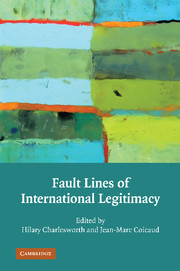Book contents
- Frontmatter
- Contents
- Acknowledgments
- Contributors
- Introduction
- PART I FROM THE HISTORY AND STRUCTURE OF INTERNATIONAL LEGITIMACY TO FAULT LINES IN CONTEMPORARY INTERNATIONAL POLITICS
- PART II THE UN SECURITY COUNCIL: EXPRESSION, VENUE, AND PROMOTER OF INTERNATIONAL LEGITIMACY?
- PART III LEGITIMACY OF INTERNATIONAL INTERVENTIONS AND HIERARCHY OF INTERNATIONAL RIGHTS
- PART IV IN SEARCH OF NEW FORMS OF INTERNATIONAL LEGITIMACY: BETWEEN POWER AND PRINCIPLES
- Conclusion: The Legitimacies of International Law
- Index
- References
Conclusion: The Legitimacies of International Law
Published online by Cambridge University Press: 06 April 2010
- Frontmatter
- Contents
- Acknowledgments
- Contributors
- Introduction
- PART I FROM THE HISTORY AND STRUCTURE OF INTERNATIONAL LEGITIMACY TO FAULT LINES IN CONTEMPORARY INTERNATIONAL POLITICS
- PART II THE UN SECURITY COUNCIL: EXPRESSION, VENUE, AND PROMOTER OF INTERNATIONAL LEGITIMACY?
- PART III LEGITIMACY OF INTERNATIONAL INTERVENTIONS AND HIERARCHY OF INTERNATIONAL RIGHTS
- PART IV IN SEARCH OF NEW FORMS OF INTERNATIONAL LEGITIMACY: BETWEEN POWER AND PRINCIPLES
- Conclusion: The Legitimacies of International Law
- Index
- References
Summary
In memory of Thomas Franck
International lawyers have been less interested in the concept of legitimacy than political scientists or international-relations scholars. Indeed, Thomas Franck lamented in 1987 that international lawyers positively avoided the topic. The traditional approach was for lawyers to use the notions of legality and legitimacy more or less interchangeably; a legal context was assumed to confer automatically some type of legitimacy on the outcome of deliberations. It is striking that critiques of the substance of international law, such as those from the developing world or those drawing on critical and feminist theories, do not usually resort to the language of legitimacy to emphasize international law's inadequacies. Rather, they typically propose the creation of more law to remedy the deficiencies of the international legal system.
The North American Treaty Organization's (NATO's) bombing of Serbia and Kosovo in 1999 sparked an exploration of the differences between legality and legitimacy by international lawyers. The attack by NATO was certainly prima facie illegal: it was conducted without the endorsement of the United Nations (UN) Security Council and it was not an obvious use of the right to self-defense recognized in the UN Charter. Both scholars and politicians elaborated the idea of the legitimacy of the bombing – in the face of a humanitarian emergency caused by the Serbian government – to provide a contrast to what they saw as the morally inadequate or unattractive legal response.
- Type
- Chapter
- Information
- Fault Lines of International Legitimacy , pp. 389 - 398Publisher: Cambridge University PressPrint publication year: 2010
References
- 1
- Cited by



